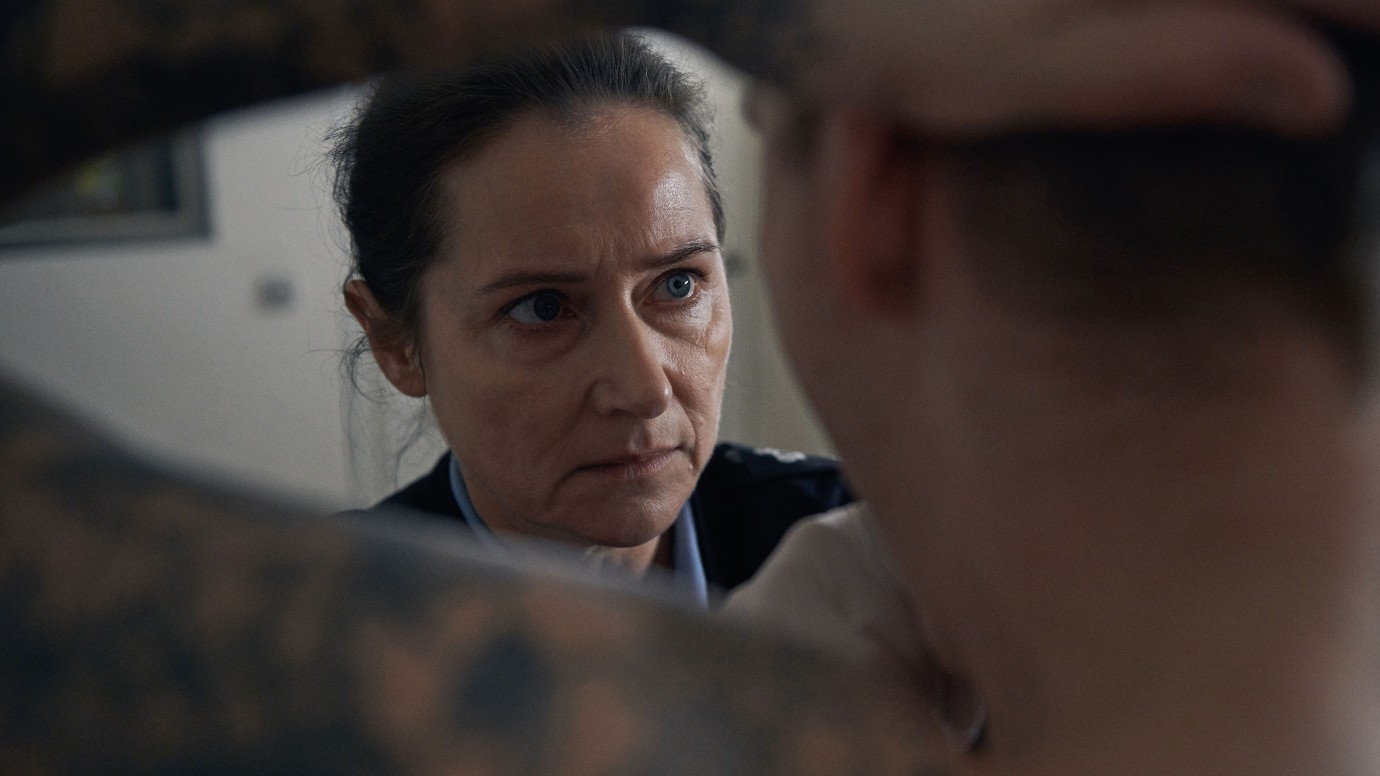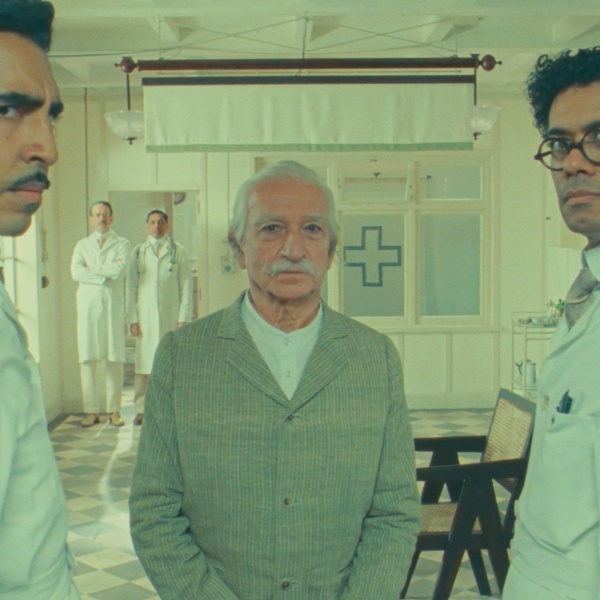Doubling down on his breakout success, “The Guilty” writer-director Gustav Möller returns with another claustrophobic — almost single-location — thriller about a morally compromised member of law enforcement whose personal failings reflect the structural flaws of the system that upholds their power. I guess you can’t have too many of those. “Sons,” at least, is a richer and more probing thing than Möller’s debut, even if the pointed questions that it forces out of its hyper-contained premise ultimately make this steely two-hander feel more like a sociopolitical thought exercise than a living portrait of punishment and salvation.
Where “The Guilty” was confined to an emergency call center, “Sons” takes place almost entirely within the walls of a maximum-security jail on the outskirts of Copenhagen. A prison guard played by the great Sidse Babett Knudsen, Eva is of course free to come and go as she pleases, but the film’s limited purview makes it seem as if this mild-mannered woman is no less imprisoned in this place than any of the inmates she’s overseen across the long span of her career. If Eva has a life outside of her work, she doesn’t seem in any sort of hurry to get back to it. On the contrary, the ease she brings to each one of her shifts in the prison’s low-danger ward suggests that she finds a certain peace through her job and the maternal sense of control that it allows her to wield over dozens of parentless men at once. Eva begins each morning by asking her inmates if they slept well the previous night, and when fights erupt over phone time and the like, she sorts them out with the stiff upper lip of a disappointed schoolmarm.
Alas, Eva isn’t quite so well-adjusted as she appears, and something about the sinewy new inmate she spies on his way towards the prison’s most violent ward seems to unmoor her in a heartbeat. His name is Mikkel (Sebastian Bull), he’s built like an untamed bronco, and he’s young enough to be Eva’s son — or, as we quickly surmise, to have killed him while serving time in another jail a few years earlier. There’s no reason why Mikkel would recognize Eva or know the role that he’s played in her life, but you have to assume that Eva’s supervisors would be able to put two and two together. They don’t, it never even comes up, and “Sons” requires you to accept that Eva carries the biggest part of her backstory like a secret that she can’t share with any of her co-workers. Needless to say, Möller isn’t afraid to sacrifice a crucial piece of logic in order to turn Eva and Mikkel into the perfectly closed circuit that powers this story.
In fairness to Möller, the dynamic between these people is compelling enough to overcome its implausibility. Eva is quietly delighted by this twist of fate (which feels to her like a quirk of justice unto itself), and “The Duke of Burgundy” fans will recognize the illicit sadism that Knudsen mines from her character’s situation. Eva requests a transfer to the jaundiced basement ward where Mikkel is housed alongside all of the prison’s most violent offenders, and if the environment recasts her gender as more of a vulnerability than a source of strength, Eva quickly asserts that she is not to be fucked with.
At first, she merely toys with Mikkel — denying him cigarettes, subjecting him to solitary confinement, and otherwise getting off on her dominance over the man who ruined her life. But retribution proves addictive, and it doesn’t take long for Mikkel to realize that there’s a personal bent to his punishment. It’s only a matter of time before Eva crosses the line and gives Mikkel the upper hand, turning her revenge fantasy into a nightmare that exposes her power trip for what it is and leaves Eva at the mercy of her favorite prisoner.
This reversal, and the escalation that leads to it, is made all the more compelling by the vacuum that Möller creates for it (Jasper J. Spanning’s shallow-focus 4:3 cinematography only adds to the all-consuming nature of the drama), but “Sons” maintains its icy grip because of the creeping realization that Eva — for all of her personal baggage — is still a microcosm of the institution that employs her. Sure, her animus has a particular history behind it, but her relationship with Mikkel reflects the ambivalence of a prison system that hides its punitive nature behind the transparent scrim of “justice.”
Is Eva’s role to help rehabilitate these men, or to administer their punishment? Does her vendetta against Mikkel make her worse at her job, or does it simply reveal the essence of a retributive society that needs — and likes — to dominate criminals in order to codify their sense of justice and retain their sense of control? (The finest gracenote of Möller’s script has to do with Eva’s self-resentment over her failure to raise her own son right, and her lingering uncertainty as to how much control she had over his ultimate fate).
These questions percolate within every scene, and while the film around them increasingly struggles to contrive meaningful contexts in which those questions might be asked, Knudsen endows her character with such a tortured sense of right and wrong that Eva is able to become a fully fleshed stand-in for the moral dissonance of Danish society. For his part, Bull plays Mikkel with the impenetrability of a wild animal; “Sons” gives him every opportunity to soften up and spoon-feed Eva a dose of her own medicine, but Mikkel remains desperate and unpredictable enough for us to question the potential of his rehabilitation, and who might be at fault for him possibly falling short of that goal. “Some people can’t be saved,” Eva mutters at one point. “That’s just the way it is.” Unresolved and deflatingly rhetorical as it might be, Möller’s thriller maintains its bruising hold over us because it refuses to see that as a failure of his country’s prison system, as opposed to its ultimate success.
Grade: B-
“Sons” premiered at the 2024 Berlin International Film Festival. It is currently seeking U.S. distribution.







